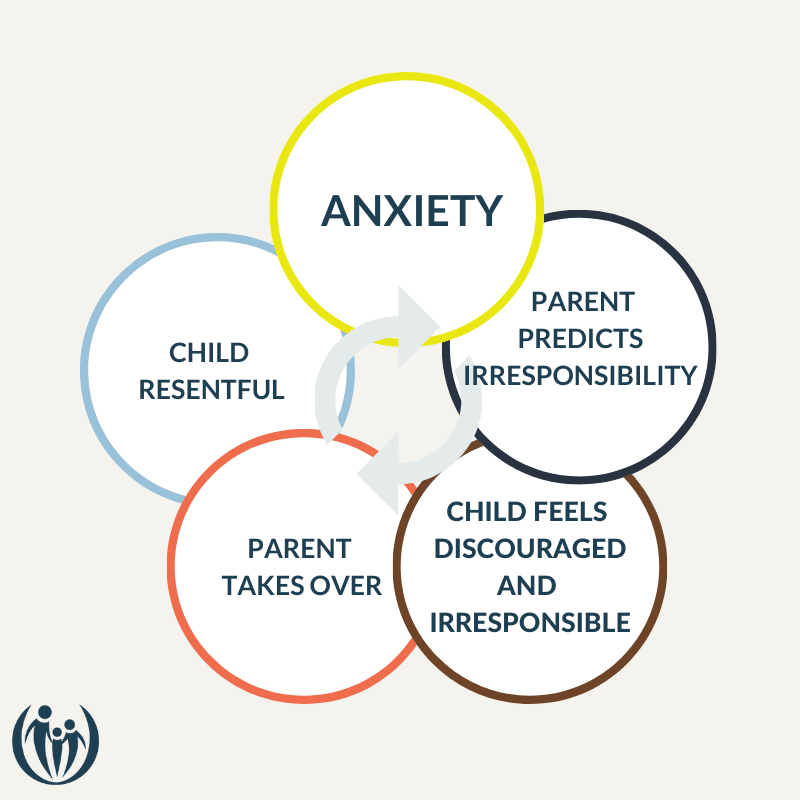
Your Child’s Grades Don’t Matter (To You)
And why their grades might improve once you believe this.

It seems there’s a problem: grades don’t matter to your child. They just don’t care! Or at least it appears that way. You know that grades are not the most important thing in life but…they are important. You want your child to understand that there’s a connection between working hard and “success” later in life.
So you’re worried. Perhaps upset. And you might even push your child toward improvement.
Somewhere in this struggle a problem often emerges. Parents feel frustrated and push harder. Kids resist. Power struggles grow in intensity as parents feel more responsible and kids feel less responsible. Everyone feels discouraged.
This spiral makes compassion and grace hard to come by. The fruit of God’s spirit becomes tough to access. You want to teach your child kindness, diligence and perseverance but are, instead, likely teaching stubbornness, defensiveness, and performance-based values.
Here’s some research food for thought before we get to some solutions:
“…poorer outcomes were seen among children who perceived either mothers or fathers valuing their achievements more highly than they valued being kind to others. These youth experienced more… depression and anxiety, … acting out behaviors and lower self-esteem… these students also had lower GPAs, and were reported by teachers to have more learning problems and disruptive behavior at school.”
You have good intentions for your child. So let’s dig into some insights on how those good intentions get derailed, and how to more effectively influence your child toward wisdom for taking responsibility for their own grades.
As a parent coach, I’ve helped many parents find ways to wisely and gracefully encourage kids’ responsibility without damaging the relationship with hurtful patterns. Here’s the gist of what I’ve learned:
The anxiety-nagging cycle
It helps to understand the cycle that often happens. It almost always begins with some form of anxiety:
- Anxiety about your child’s future causes you to worry that avoiding hard work will be a life-long pattern and they will always struggle. Your child believes the message, “I am irresponsible.”
- This belief discourages your child who becomes less, rather than more, responsible as they begin to fulfill your negative projection.
- Your child’s growing irresponsibility causes you to rationalize doing things for them that they could do themselves.
- As you micromanage your child’s responsibilities, resentment grows.
- You grow more discouraged and anxious, and the process starts over as the relationship begins to be increasingly defined by power struggles.
If I regularly do things for my kids that they can do for themselves, it sends a message:“You are irresponsible and incapable of doing things on your own.”

Encouraging without nagging
Rather than nagging your child to perform the way you would like, you can focus on communicating four powerful “You are…” messages that will begin to breathe life into your relationship.
1) You are SAFE with me, even if you fail this subject
When we have thoughts or beliefs like, “If my child is failing now, what will it look like when they’re older?” or, “This kid just won’t learn!” it tends to lead to more anxiety, more pushing, and the cycle described above rolls on. But when we can learn to think and believe differently, fueled by God’s wisdom, we can begin a new, more hope-filled, and encouraging cycle.
Here are some ideas to get you started:
- “If my child fails this class, they can grow and learn and have an opportunity to do better next time.”
- “I know my child has worked hard before at things that are important to them.”
- “God has significant plans for my child, even if they don’t do amazing in school.”
- “My child is not MY report card. Their grades are their grades, not mine.”
- “This is an opportunity for my child to really internalize my unconditional love.”
In Matthew 12:34, Jesus says, “the mouth speaks what the heart is full of.” What you believe in your heart toward your child will come out of your mouth. So make it a point to listen to what you are saying to others, or yourself, about your child’s struggles. Anchor yourself in God’s truth, and begin to “speak the truth in love” out loud!
2) You are LOVED no matter what grade you get
It’s not natural to feel and express love when a relationship has been full of conflict. But learning to find that love and express love to your struggling child sets a tone and example of Christ’s love. You can start with affectionate words, playfulness or humor, and empathy: “You know what, math was often hard for me too. I get how frustrating it can be!”
As your light-hearted affection begins to land, your child’s defenses may drop and you might leave a note about your love for your child before a big test. Then you can do something special and fun afterward, regardless of the outcome of the test.
Remind your child they are fearfully and wonderfully made in God’s image. When your child begins to understand that their identity comes from the value God has placed on them, they can begin to really internalize that they are accepted and loved no matter what.
Encouraging Kids Who, “Just Don’t Care!”
Want to hear more on this topic? Check out our podcast, “Encouraging Kids Who, ‘Just Don’t Care!’. It’s a good one!
3) You are CALLED and CAPABLE of doing your schoolwork
Of all the things your child feels, capable is probably the least. A misbehaving, struggling child is almost always a discouraged child.
Look for small positive steps; perhaps ones you overlooked: “I noticed you passed three classes last year. In trying to push you to pass math, I didn’t even recognize the success you had in those other classes. I want to do a better job at noticing all the things you’ve done well.”
Calling out even the most minimal effort will be an encouragement. (Believe me, the effort is there if you are willing to see it!). Philippians 4:8 teaches to focus on, “…whatever is true, whatever is noble, whatever is right, whatever is pure, whatever is lovely, whatever is admirable, if anything is excellent or praiseworthy, think about these things”.
Start the school year (or next semester) with a few questions that build capability. Be prepared, but don’t react to, indifferent or negative responses:
- How would you like school to go this year? (“I don’t know!!”)
- What kinds of grades are you hoping for this year? (I’ve heard a child say “D+”)
- What help do you want or need from me? (A likely response from a discouraged child is “None! I’ll be fine. Leave me alone.”)
If you’ve been overly involved, reset your intentions:
“I think I’ve been overinvolved in your schoolwork and it’s driven a wedge in our relationship. Would you agree? (head nod from child) I don’t want that kind of relationship anymore. I’m really sorry about that. I want you to be responsible for your grades because they are your grades and not mine. I believe you can do it and I want to support you in any way I can. How about we check the parent portal together once every week; maybe Fridays? I won’t lecture you or criticize, but then we’ll both know where things stand.”
But the bottom line of the message “You are called and capable…” isn’t about schoolwork. The importance of your child’s grades to you will fade when you consider other important values – of faith, kindness, integrity, perseverance, creativity, resourcefulness…
This study of parents’ values and impact on kids’ academics revealed, “…the best outcomes were among children who perceived their mothers and fathers as each valuing kindness toward others as much as, or more than, achievements.”
Simply changing the nature of your dinner table conversations can speak volumes to kids. Instead of, “How did your math test go?”, you can ask, “How were you a blessing to someone today?” “What did you feel good about today?” “How did you work hard today?”
Teach your children God’s truth about what real “success” means.
“Let not steadfast love and faithfulness forsake you; bind them around your neck; write them on the tablet of your heart. So you will find favor and good success in the sight of God and man.”
Proverbs 3:3-4
4) You are RESPONSIBLE for your classes and schoolwork
Most parents want to begin here, but it is not the place to start. When your child’s academic performance is underwhelming, keep the three previous “You Are…” messages in mind as you seek to nurture responsibility.
When checking in on Friday, if your child gets way behind, a natural impact would be a failing grade or your child needing to negotiate with a teacher about how to catch up. (Negotiation is a good skill to develop!)
If some basic and clear expectations aren’t met and a more immediate impact is needed, you can decide to put consequences in place, but with grace and kindness. This will make them more effective because your child will know this is about their best interests, not your need for control. You might have an understanding with your child to forfeit whatever weekend privilege tends to distract them from their studies.
Your child needs to learn how to be responsible for their grades, choices, time management and, ultimately, their life. They are growing and learning and are a work in progress. God expects us to make mistakes, knowing they can be a wonderful learning opportunity. Failures may be more valuable for kids’ growth than their successes!
Galatians 6:7 says, “a man reaps what he sows.” As we let our kids have more freedom to learn the sowing and reaping principle for themselves, we can relax and be their mentor instead of their manager!
When grades don’t matter to you so much anymore, and you let the weight of responsibility shift from you to your child, you are free to empathize with and encourage your struggling child. This builds a connective, rather than adversarial, relationship. While this can be a big and scary step, your family is worth it.
If you are struggling with a child’s lack of motivation and are unsure how to free your family from judgement and anxiety, consider working with one of our parent coaches.







